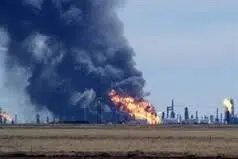
Photo U.S. Chemical Safety Board www.csb.gov
At 1:20 p.m. on March 23, 2005, one of the most devastating industrial disasters ever experienced in the U.S. occurred at the British Petroleum (BP) refinery in Texas City, Texas. Fifteen people were killed, and 180 people were injured.
Production was halted for nearly two years, resulting in financial losses exceeding $1.5 billion.
On January 30, 2006, Synthron at Morganton, North Carolina sustained an explosion that killed one worker and injured 14, destroyed the facility, and damaged off-site structures.
Both of these incidents were classified as process safety accidents. Unfortunately, there have been many such accidents during the past few years, as evidenced by the investigative studies conducted by the U.S. Chemical Safety and Hazard Investigation Board (CSB). Obviously, process accidents can have catastrophic effects, resulting in fatalities and significant property and economic damage.
CSB investigative reports often cite a lack of process safety and troubleshooting knowledge and skills as a contributing factor to an accident. Furthermore, industrial incidents are, by no means, limited to the petrochemical/refining industry sector.
A recent review of incidents within the broader energy industry revealed incidents in the oil and gas, power generation, ethanol production, and biodiesel production sectors. Thus, troubleshooting skills are necessary for developing a highly competent energy workforce in the U.S., maintaining the consistent production of energy, lessening our dependence on foreign energy sources, and contributing to the security and safety of our energy facilities.
In response to this need 18 generic equipment scenarios and 16 process/system-specific troubleshooting instructional modules for energy technicians that can either be used as stand-alone modules or integrated into a capstone course for college students.
The instructional modules will target the biofuels, power generation, and petroleum (upstream and downstream) sectors. The modules will provide students with an opportunity to acquire relevant troubleshooting knowledge and skills that prepare them to handle process upsets while working in the energy industry. Furthermore, students will be able to showcase their acquired troubleshooting skills during a simulator competition.
The intellectual merit of the project can be summarized as: (a) the troubleshooting instructional modules incorporate elements defined by faculty and industry Subject Matter Experts (SMEs) to be instrumental in supporting students’ acquisition of troubleshooting skills; (b) the modules will cover the most common processes, systems and equipment in the energy industry as identified by partners, providing both basic and advanced modules; (c) with a history of successful collaborative efforts, the partners represent a diverse group of companies and institutions. The collective expertise of partners represents the full spectrum of the energy industry and is vital to the its success.
The broader impact is: These modules help promote national security and energy independence by providing a highly skilled and educated energy technician workforce; and are valuable in disseminating insights on students’ critical thinking and troubleshooting skills to the education community.

This material is based upon work supported by the National Science Foundation under Grant No. 1457711. Any opinions, findings, and conclusions or recommendations expressed in this material are those of the author(s) and do not necessarily reflect the views of the National Science Foundation.